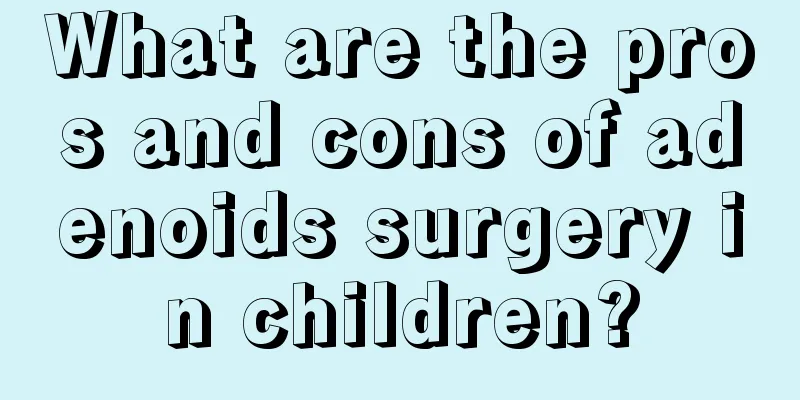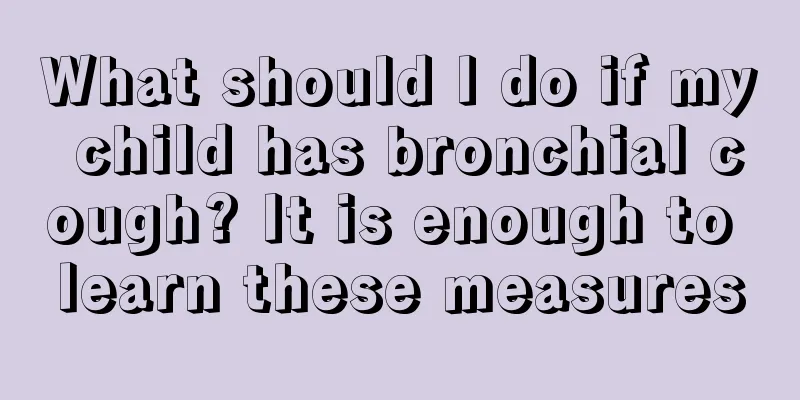What are the reasons for children's vomiting?

|
We all know that if we don’t pay attention to hygiene, it will bring us many diseases, and vomiting may be one of them. However, there are many reasons for vomiting. The most common one is severe cold and cough. If a breastfeeding baby vomits, it may be due to an allergy to breast milk or indigestion. These all need further diagnosis by a doctor to be confirmed, and only by finding out the cause can better treatment be achieved! 1. Feeding Problems In the first few months of your baby's life, vomiting is most likely due to a less serious feeding problem, such as overfeeding, indigestion, or an allergy to protein in breast milk or formula. 2. Gastroesophageal reflux Gastroesophageal reflux If your baby is otherwise healthy but vomits soon after eating or for no apparent reason, gastroesophageal reflux is most likely to be the cause. Gastroesophageal reflux occurs when the muscles between the baby's esophagus and stomach do not function properly, causing food in the stomach to flow back up into the throat. Although your baby won't talk about it, he may feel abdominal discomfort or a burning or discomfort in the throat or chest. This problem will most likely disappear automatically by the time the baby is one year old, because the muscles in the baby's gastroesophageal area will have developed stronger and more powerful by then. 3. Gastrointestinal bacteria Gastrointestinal bacteria When the baby is a few months old, gastrointestinal bacteria are the most likely cause of vomiting in the baby, especially if the baby goes to a daycare center during the day, or if some older children around bring new germs to your home, this is more likely to happen. You must insist that everyone in your family wash their hands thoroughly after using the toilet or changing your baby's diaper to prevent the spread of germs. At the same time, try to ensure your baby's hands are clean. When babies are infected with gastrointestinal bacteria, in addition to vomiting, they may also experience symptoms such as diarrhea, loss of appetite and fever. 4. Cold or other reasons Colds or other respiratory infections Respiratory infections may also cause vomiting because babies can easily become nauseated due to a blocked nose. 5. Infection or serious illness Occasional vomiting may indicate an infection in your baby's respiratory system, urinary tract, or ears. In rare cases, vomiting may even indicate pneumonia, meningitis, or Reye's syndrome. If your baby looks very ill or has other symptoms, your baby's vomiting may be a sign of a serious illness. |
<<: What are the symptoms of children's intellectual disability?
>>: How to determine if a child has a fish bone stuck in his throat?
Recommend
Baby has a big lump in the breast after weaning
Weaning is a particularly difficult process becau...
What foods can supplement iron for children?
Iron plays a vital role in maintaining human heal...
What is the reason for elevated alkaline phosphatase in children?
The reasons why children have high alkaline phosp...
What discomfort does the baby have when teething?
Teething is a stage that every baby has to go thr...
Is it normal for babies to cough occasionally?
Babies have relatively poor resistance, and are p...
What should I do if my baby has a stuffy nose, runny nose, sneezing and coughing?
The main symptoms of a cold are nasal congestion,...
Will a febrile seizure leave sequelae?
Children's physical health is an issue that t...
Baby confinement care
Newborn babies are the pride of this world, and t...
Seven and a half month baby food recipes
Babies of seven and a half months old have a part...
The reason why baby's yellow-green stools are formed
Many parents have some misunderstandings when fee...
Reasons why babies blink frequently
Every parent wants their child to grow up healthy...
Is it good to drink honey if the baby has pneumonia?
For all parents, paying attention to the baby'...
What to do if your baby has intracranial hemorrhage
Intracranial hemorrhage in babies is a very frequ...
How to care for fat particles on baby's face
Many babies will be found to have fat particles o...
Can babies get vaccinations for mild colds?
Vaccinations are generally what we often call vac...









